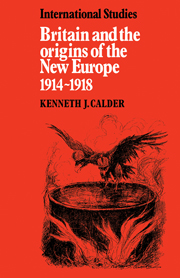Book contents
- Frontmatter
- Contents
- Dedication
- Acknowledgements
- Map
- Introduction
- 1 The initial contact
- 2 Yugoslavia in the Balkan negotiations, 1914–15
- 3 Espionage and propaganda, 1914–16
- 4 War aims, 1916
- 5 Britain and Austria-Hungary, 1917–18
- 6 The recognition of the Polish National Committee, 1917
- 7 Commitment by implication, 1918
- Conclusion
- Notes
- Bibliography
- Index
3 - Espionage and propaganda, 1914–16
Published online by Cambridge University Press: 07 October 2011
- Frontmatter
- Contents
- Dedication
- Acknowledgements
- Map
- Introduction
- 1 The initial contact
- 2 Yugoslavia in the Balkan negotiations, 1914–15
- 3 Espionage and propaganda, 1914–16
- 4 War aims, 1916
- 5 Britain and Austria-Hungary, 1917–18
- 6 The recognition of the Polish National Committee, 1917
- 7 Commitment by implication, 1918
- Conclusion
- Notes
- Bibliography
- Index
Summary
Since the initial relations between the government and the nationality organizations were established by the émigrés, the government responded on the merits of each particular case without reference to any clearly defined comprehensive policy for the treatment of the enemies' subject nationalities. The officials were quick, however, to realize that the disgruntled émigrés were potential weapons of war. But the Entente also possessed subject nationalities, and the Central powers came to the same conclusion. Since the use of subject nationalities as weapons of war began gradually, almost imperceptibly, it is difficult to determine which belligerent acted first. The British may have begun the process, but throughout the war they acted as if they were merely responding to German initiatives. The British government was at liberty to accept or reject the use of the émigrés in unorthodox warfare against the Central powers, but once it was clear that the enemy intended to use subject nationalities against the Entente, the government had little choice but to retaliate in a similar fashion or accept the unfortunate consequences of enemy policy. Circumstances seemed to compel the government to use the nationalities. This unorthodox type of warfare was not new; nevertheless, it was a symptom of the development of total war.
The Germans used the Indian and Irish nationalists while the British used the Yugoslavs and the Czechoslovaks. The Poles, however, were unique in that their national cause was not necessarily committed to either the Entente or the Central powers.
- Type
- Chapter
- Information
- Britain and the Origins of the New Europe 1914–1918 , pp. 47 - 78Publisher: Cambridge University PressPrint publication year: 1976



